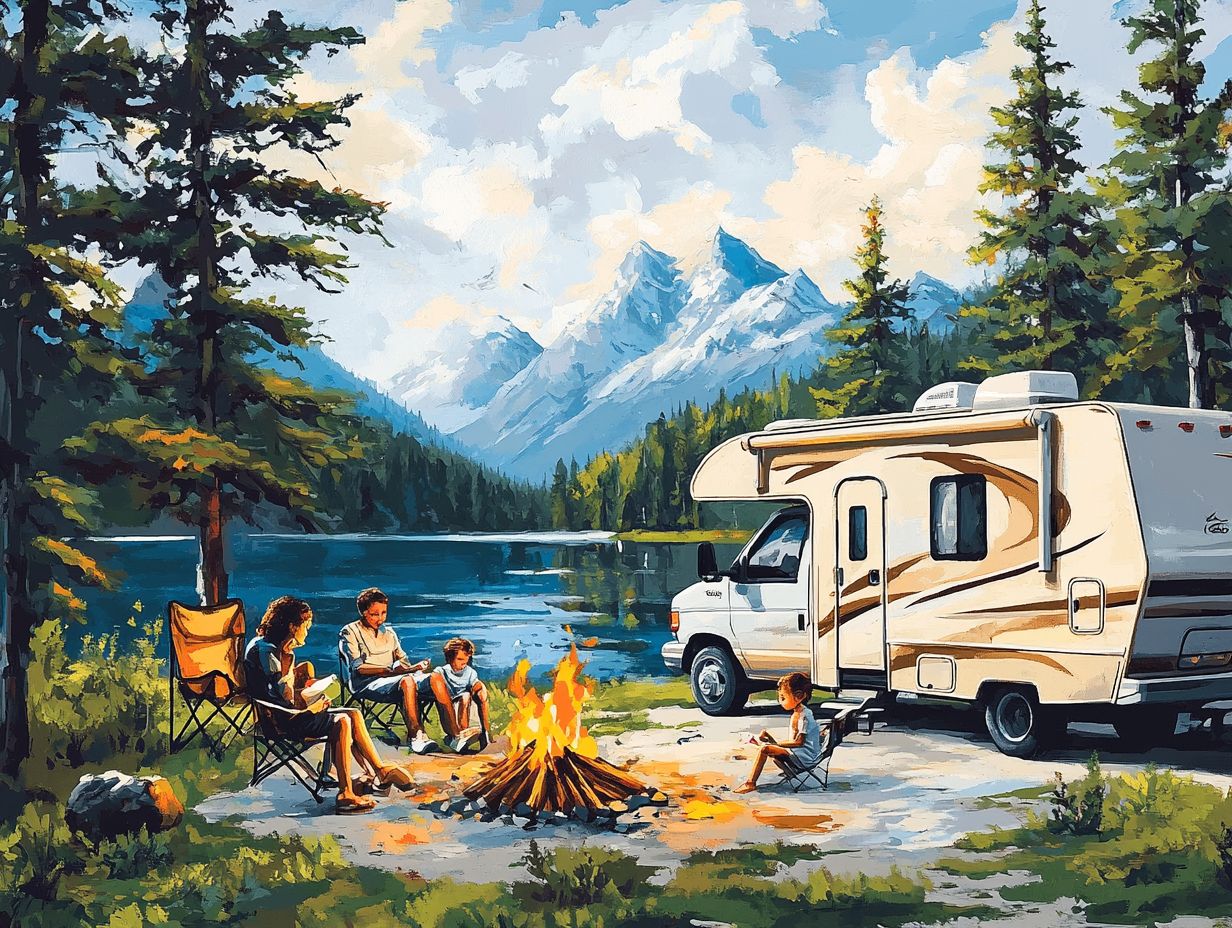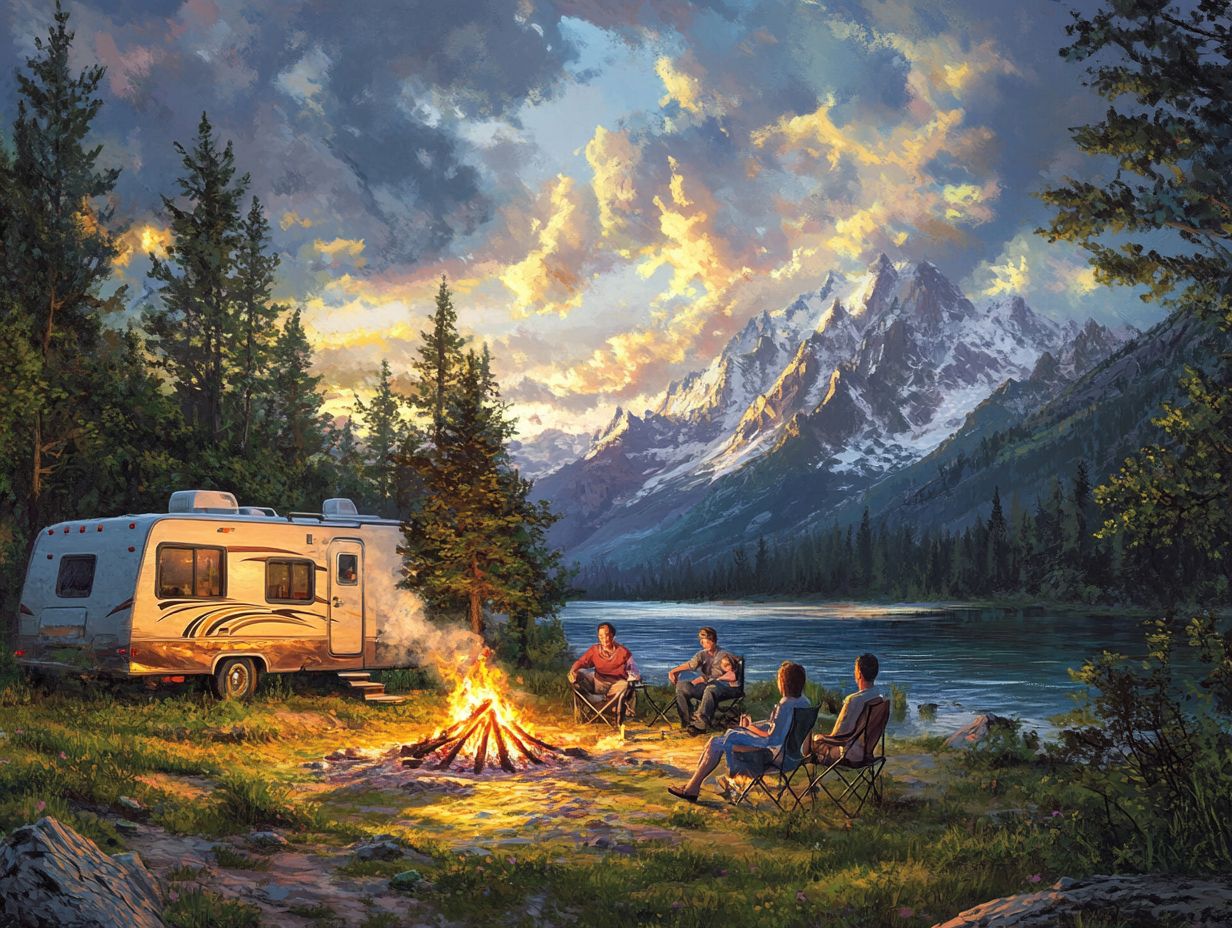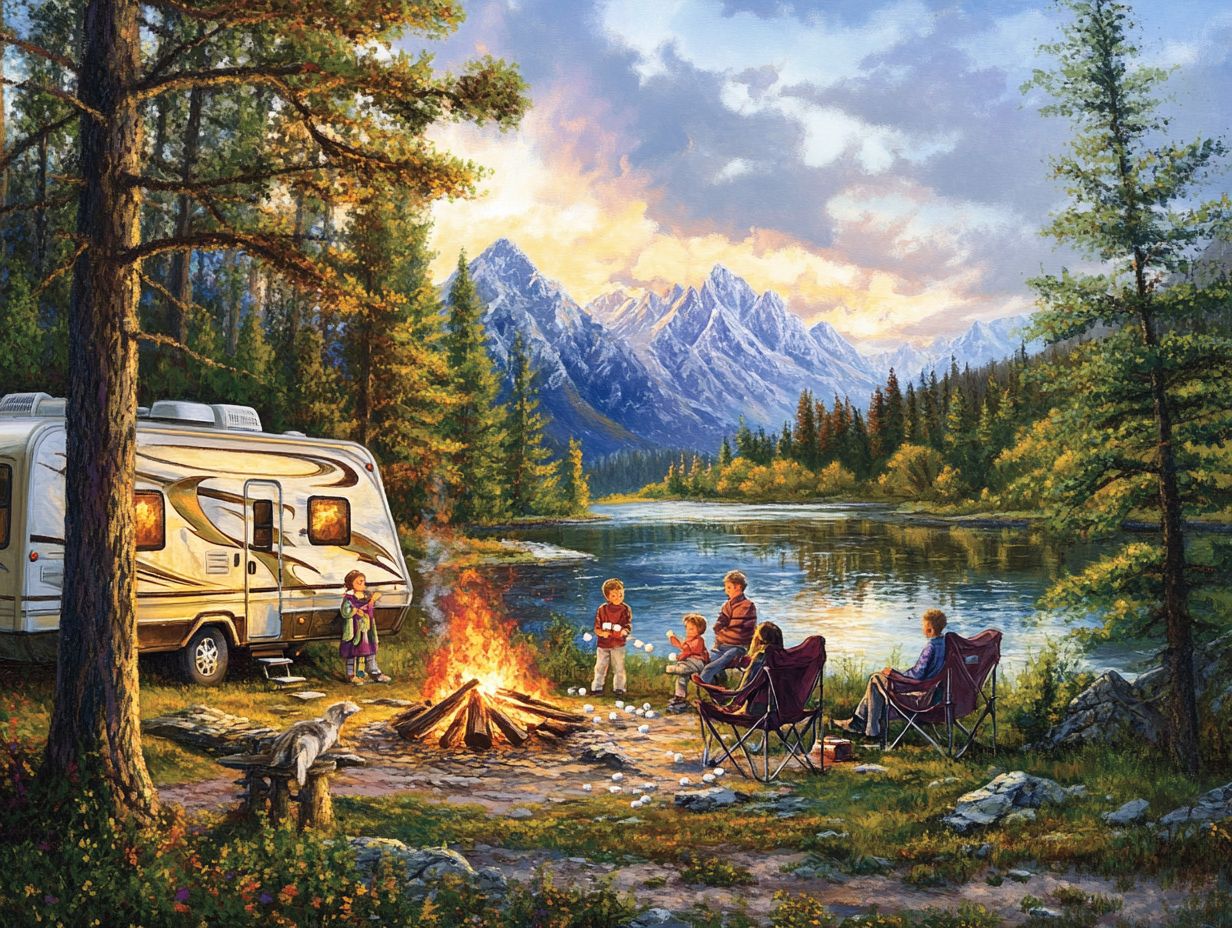What is Coverage for Recreational Vehicles?
Imagine hitting the open road with your home on wheels, ready for adventure at every turn! Recreational vehicles (RVs) provide you with a remarkable fusion of adventure and comfort, enabling you to explore the great outdoors while savoring the conveniences of home.
Owning an RV certainly comes with its fair share of responsibilities, one of the most significant being the need for comprehensive insurance coverage.
This article delves into the various types of RVs, highlights the importance of securing adequate insurance, and outlines the different coverage options available to you.
You ll discover the factors that influence insurance rates and receive valuable tips for selecting the right policy tailored to your needs.
Whether you re a seasoned RVer or embarking on your journey for the first time, grasping the nuances of RV insurance is essential for ensuring a worry-free adventure.
Contents
- Key Takeaways:
- Understanding Recreational Vehicles
- Importance of RV Insurance Coverage
- Types of Coverage for RVs
- Factors Affecting RV Insurance Rates
- How to Choose the Right RV Insurance
- Frequently Asked Questions
- What is Coverage for Recreational Vehicles?
- What does Coverage for Recreational Vehicles typically include?
- Do I need Coverage for Recreational Vehicles?
- Are all types of recreational vehicles covered under Coverage for Recreational Vehicles?
- How much does Coverage for Recreational Vehicles cost?
- Can I add additional coverage to my Coverage for Recreational Vehicles policy?
Key Takeaways:

- RV insurance coverage protects your recreational vehicle from unexpected events, such as accidents and damages.
- Types of coverage for RVs include comprehensive, liability, and collision coverage. These provide financial support for repairs, medical expenses, and property damage.
- Factors such as the age and condition of the RV, driving record, and location can affect insurance rates. It is important to assess your needs and compare policies to choose the right RV insurance for you.
Understanding Recreational Vehicles
Recreational vehicles (RVs) are not just motorized or towed units; they represent a lifestyle full of adventure and exploration, inviting you to traverse the great outdoors with ease.
These versatile vehicles come in a variety of forms Class A, Class B, and Class C RVs, along with travel trailers and camper vans each tailored to meet distinct preferences and requirements.
Grasping the intricacies of these vehicles is crucial for anyone contemplating the RV lifestyle or in search of RV insurance that delivers comprehensive coverage and peace of mind.
Definition and Types of RVs
Recreational vehicles, or RVs, come in a variety of types, each tailored to suit your specific needs and preferences. You ll find options like Class A, Class B, and Class C RVs, alongside travel trailers and camper vans, each offering unique advantages.
If you opt for a Class A RV, you’re stepping into a realm of luxury and space, perfect for those long-term adventures with family or friends.
Class B RVs, often called camper vans, are compact and nimble, making them ideal for urban escapades or spontaneous weekend getaways. Meanwhile, Class C RVs offer a harmonious balance, featuring a distinctive over-cab sleeping area that makes them particularly family-friendly.
Travel trailers provide versatility, allowing you to detach your vehicle for local excursions, while camper vans shine when it comes to effortless mobility. The type of RV you choose not only impacts your comfort and travel experience but also plays a crucial role in determining your insurance needs.
For example, larger Class A RVs usually necessitate more comprehensive coverage due to their value and size, while smaller camper vans may come with different insurance considerations. This highlights the importance of thoroughly understanding coverage for watercraft options available for each type of vehicle.
Importance of RV Insurance Coverage
RV insurance coverage is an important part of owning a recreational vehicle, offering financial protection against a range of risks and liabilities. Understanding coverage for specialized vehicles ensures that both your vehicle and its occupants are well-protected during your adventures on the road.
The right insurance policy also fulfills legal duties; it grants you peace of mind, allowing you to fully enjoy your journeys while being shielded from potential mishaps. Selecting a reputable insurance provider and comprehending your options can greatly enhance your overall experience.
- Comprehensive coverage protects you from many types of accidents and damages.
- Liability coverage takes care of damages you may cause to others.
- Collision coverage helps with repairs to your RV after an accident.
Don’t wait until it’s too late! Ensure you’re covered before your next trip!
Why RVs Need Insurance
RVs necessitate insurance primarily to shield you from liabilities and physical damage. Their unique characteristics pose specific risks that standard auto insurance often fails to cover adequately.
These mobile homes double as both transportation and living quarters, significantly amplifying the potential for accidents on the road. Additionally, the risk of theft is notably increased due to the size and value of recreational vehicles, making dedicated insurance coverage essential.
You should also consider the potential for damage to personal property inside the RV. Those costs can accumulate quickly. Liability coverage protects you from injury claims from others involved in an accident.
Understanding various insurance policies is crucial. Neglecting this can lead to unexpected out-of-pocket expenses during claims, disrupting your money management when you least expect it.
Types of Coverage for RVs

Discover the essential coverage options that keep your adventures safe and worry-free! Understanding the different types of coverage available for RVs, including coverage for rental vehicles, is essential for selecting the insurance policies that best suit your unique needs.
Your coverage options typically encompass comprehensive coverage, liability coverage, and collision coverage, among others. For those specifically interested in RVs, understanding what is coverage for utility vehicles is crucial, as each type serves a specific purpose and addresses various risks associated with ownership.
Comprehensive Coverage
Comprehensive coverage protects you against non-collision-related incidents. This includes physical damage from theft, vandalism, weather-related events, and other unexpected risks.
Investing in this coverage is crucial for safeguarding your RV investment. It gives you peace of mind even when the unexpected occurs.
While liability coverage focuses on damage to others during an accident, comprehensive coverage offers a wider safety net. This is particularly important since your vehicle is exposed to various environmental elements and risks, whether parked or on the road.
Keep in mind that while comprehensive coverage addresses many risks, it may not cover all types of damage, such as mechanical failures or routine wear and tear. This highlights the need for a well-rounded insurance strategy tailored to your needs.
Liability Coverage
Liability coverage safeguards you from financial loss in accidents causing bodily injury or property damage to others.
This type of coverage is crucial when faced with situations on the road, like an unexpected collision with another vehicle, which could result in injuries or property damage.
Without adequate liability coverage, you could shoulder the entire financial burden of medical expenses or repair costs. This could lead to substantial debt.
Should a claim arise, it may impact your insurance premium rates and future insurability. Incorporating this coverage into your RV insurance strategy protects you against unforeseen events and ensures peace of mind while cruising along the open road.
Collision Coverage
Collision coverage is an essential component of your RV insurance. It offers you financial protection against physical damage to your RV during accidents, no matter who’s at fault. For those with vintage bikes, understanding coverage for vintage motorcycles can also be crucial.
If you’re involved in a collision, this coverage ensures that repair or replacement costs are taken care of. This allows you to focus on enjoying your travels without unexpected financial strains.
Understanding how collision coverage operates is crucial for anyone invested in recreational vehicles. It plays a significant role in protecting your assets.
Factors like your RV’s make, model, age, and your driving history influence your insurance premiums related to this coverage. What would you do if your RV got damaged in an accident? Knowing you’re covered adds considerable value to the appreciation RV enthusiasts have for coverage for vintage cars and collision coverage.
Factors Affecting RV Insurance Rates
Numerous factors can profoundly impact RV insurance rates, making it crucial for prospective owners to grasp how these elements interplay to shape their overall insurance costs and premiums.
Among the key factors are the age and condition of the RV, the owner s driving record, and the geographical location where the vehicle is primarily utilized. Understanding these dynamics will enable you to make informed decisions as you navigate the world of RV insurance.
Age and Condition of RV

The age and condition of your RV are crucial factors in determining your insurance rates. Older models often experience higher depreciation rates and are more susceptible to physical damage.
This depreciation can heavily influence your coverage options. Insurers typically consider older vehicles to be higher risk due to potential repair costs and the likelihood of needing parts that may no longer be easily accessible.
Furthermore, the overall condition of your RV taking into account any previous accidents or mechanical failures can further drive up your premium costs.
For RV owners like you, grasping how these elements interconnect is vital. It can affect not only how affordable your premiums are but also the level of coverage you can secure, sometimes forcing you to make compromises on full coverage plans.
Driving Record and Location
Your driving record and geographical location are crucial factors that can significantly influence your RV insurance rates. Insurers take a close look at your history of accidents or claims when assessing risk.
If you maintain a clean driving record, free from violations or incidents, you typically find yourself in a favorable position. This often results in reduced premiums, as insurers perceive you as a lower risk.
Conversely, a history filled with accidents can signal a higher likelihood of future claims, which usually translates to increased insurance costs.
Your location also plays a vital role. Living in an area known for high traffic accident rates or vehicle theft can further raise your insurance costs.
Insurers often adjust policies to reflect the heightened risks associated with specific regions, making it essential for you to understand these factors as you engage in smart financial planning.
How to Choose the Right RV Insurance
Choosing the right RV insurance demands careful consideration of your personal needs, a deep dive into the myriad of insurance options available, and a thorough comparison of various policies to pinpoint the most suitable coverage for your unique circumstances.
Engaging with seasoned insurance agents can offer invaluable insights, helping you navigate toward the best choices tailored specifically to your lifestyle and the type of RV you own.
Assessing Your Needs
Assessing your needs is a crucial first step in choosing the right RV insurance. By understanding your specific lifestyle, usage patterns, and the type of RV you own, you can navigate your coverage options more effectively.
To truly evaluate your personal needs, consider how often you plan to use your RV whether it s for weekend getaways or extended road trips across the country. Your travel frequency directly impacts the coverage you need, so it’s crucial to be aware!
Additionally, the choice of travel destinations also matters. Different regions might present unique risks, such as extreme weather or higher theft rates, that call for customized coverage.
By reflecting on these factors, you can make informed decisions about the insurance options you need, ensuring you have adequate protection against potential hazards on the road.
Comparing Different Policies
Comparing different RV insurance policies is crucial for finding the best coverage that fits your needs. This approach maximizes value and minimizes costs.
As you explore insurance quotes, assess key factors like coverage limits and exclusions. These factors can impact your financial security on the road significantly.
Consider perks like roadside assistance and vacation liability. They enhance the usefulness of your insurance!
Delve into customer reviews and provider reputations. Insights from these sources reveal the reliability and support you’ll receive when it matters.
Evaluating different insurance quotes helps you understand the fine print. This ensures you make informed decisions for peace of mind during your travels.
Frequently Asked Questions

What is Coverage for Recreational Vehicles?
Coverage for recreational vehicles, or RV insurance, is designed for motorhomes, campers, and similar vehicles used for fun, including coverage for vintage motorhomes.
What does Coverage for Recreational Vehicles typically include?
This coverage usually includes liability protection, which safeguards you financially if you damage someone else’s property or injure someone while driving your RV. Additionally, it’s important to understand what is coverage for snowmobiles, as it may also cover physical damage to your RV and personal belongings.
Do I need Coverage for Recreational Vehicles?
If you own a recreational vehicle, having RV insurance is highly recommended. It’s often a legal requirement and provides financial protection against accidents.
Are all types of recreational vehicles covered under Coverage for Recreational Vehicles?
No, coverage varies by insurance company. Commonly covered vehicles include motorhomes and travel trailers, but it’s important to check with your provider to confirm coverage for special interest vehicles, including your specific RV.
How much does Coverage for Recreational Vehicles cost?
The cost of RV insurance varies based on factors like the type of RV and your driving history. On average, it can range from a few hundred to a couple of thousand dollars annually.
Can I add additional coverage to my Coverage for Recreational Vehicles policy?
Yes! Many companies offer additional options like total loss replacement and vacation liability coverage. Discuss these with your provider to find the best fit for you.






